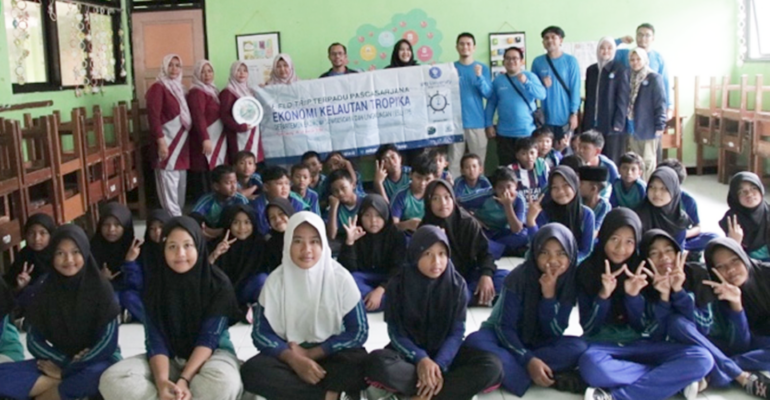SPs IPB University Students Educate Students on the Importance of Waste Management in the Coastal Sea

A total of 15 students and lecturers of the Graduate School (SPs) of Tropical Marine Economics Study Programme conducted Field Trip activities to Tidung Island, Thousand Islands Administrative Region, DKI Jakarta Province on 19/1. One of the activities carried out was community service by visiting one of the Elementary Schools (SD) in the Tidung Island area.
Dr Kastana Sapanli, Chairman of the Tropical Marine Economics Study Program conveyed the aims and objectives of the activity. He invited the students of SDN 03 Pagi to have dreams in achieving higher education in order to build Tidung Island in the future.
“Waste problem is still an issue in the management of small islands including Tidung Island. Waste in Tidung Island does not only come from households, but also from 13 estuaries on the island. Tidung Island as one of the tourist destinations in the Thousand Islands must be able to manage waste, so that the environment becomes clean and beautiful which will bring more tourists and prevent floods,” he said.
Devi Soraya, Vice Principal for Student Affairs of SDN 03 Pagi, expressed her appreciation to fellow students and lecturers from the Tropical Marine Economics Study Programme for visiting and sharing knowledge at SDN 03 Pagi.
“I hope that the knowledge shared by IPB University students can be practised by students to help maintain the cleanliness of Tidung Island and later the children of Tidung Island can continue their education to college and return to develop Tidung Island”.
The activity continued with the delivery of material by SPs IPB University students, Mira and Tenny, by providing an understanding to students about the categories of organic waste, inorganic waste to hazardous and toxic waste which was then continued with the impact on the marine environment if not managed properly.
“Waste management, especially in small islands, requires the support of various parties including the younger generation. Raising awareness from an early age about good waste management is one of the efforts that can be done to build a young generation who loves and is responsible for the coast and sea with all its beauty and resources,” said Mira. (*/Lp) (IAAS/RUM)



